Latest DePIN News

10 months ago
Auki's 2024 Milestones: Community-Driven Success and Innovation
2024 marked a significant year for Auki, characterized by the successful launch of its Token Generation Event (TGE) and a retail solution, alongside achieving various development milestones. Auki's growth can largely be attributed to its dedicated community, which plays a crucial role in building, operating, and maintaining the infrastructure that supports the network. Community members contribute resources, bandwidth, and energy in exchange for tokens, fostering a deflationary economy designed to reward early adopters. This decentralized approach is essential for ensuring privacy and autonomy in an era increasingly influenced by AI and robotics, while also encouraging innovation through community-driven applications and enhancements.
To celebrate the contributions of its community, Auki is initiating a series of interviews with diverse members, starting with Husky, a node operator. Husky emphasizes the importance of node operators in maintaining the Auki network, as they manage relay and domain servers that facilitate network traffic. His journey into the crypto space began nearly four years ago, transitioning from speculative investments to actively running nodes for projects with real utility. His daily routine is a blend of managing nodes and personal commitments, reflecting the dedication required to succeed in the crypto landscape. Husky's experience highlights the rewarding nature of participating in Auki's growth, especially with the recent airdrop that has significantly increased in value.
As Auki continues to develop its decentralized machine perception network, the contributions of community members like Husky are pivotal to its success. The Auki network aims to enhance shared spatial awareness for AI and robots, showcasing the importance of decentralized physical infrastructure networks (DePINs) in the evolving tech landscape. With a mission to improve collaborative cognitive capacity among humans and machines, Auki is at the forefront of building innovative solutions that prioritize privacy and community ownership in spatial computing. The journey toward a more decentralized future is just beginning, and Auki is committed to leading the charge alongside its vibrant community.
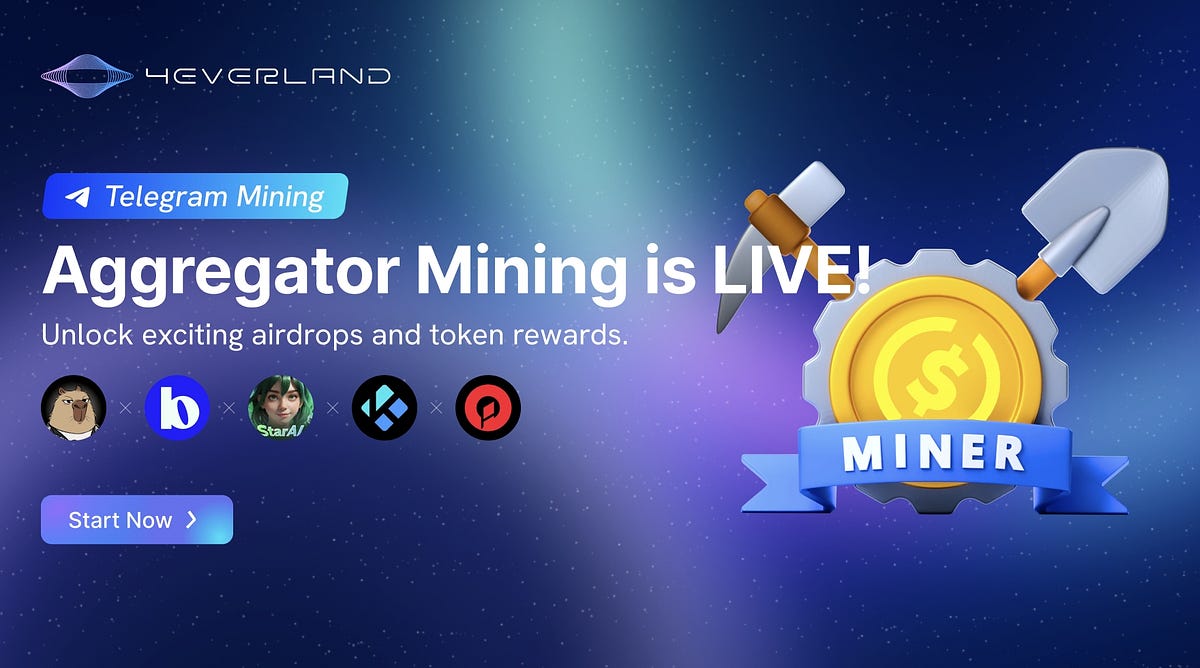
10 months ago
4EVERLAND Launches Innovative Aggregated Mining Feature
4EVERLAND has officially launched its Aggregated Mining feature, which allows users to engage in barrier-free mining through the 4EVERLAND TG MiniApp. This innovative functionality connects users with various projects within the 4EVERLAND ecosystem, enabling them to earn airdrops and token rewards effortlessly. Aggregated Mining is designed to lower the entry barriers for participation while providing project teams with a means to enhance user engagement and incentivization. By utilizing this feature, users can maximize their earning potential and foster beneficial interactions across multiple projects.
Participating in Aggregator Mining is simple and consists of three main steps. First, users must activate the 4EVER Boost in the MiniApp, which is essential for first-time miners. Next, they can select a collaborative project and complete specific tasks, such as following social media accounts or engaging with project content. Once these tasks are completed, mining for the chosen project is automatically activated. Finally, users should log in daily to collect their mining rewards, with the option to complete additional tasks for increased output. It is crucial to claim rewards regularly, as failure to do so may pause the mining process.
To enhance earnings, users can take advantage of several tips, including activating all three core Boost modules—Storage, Compute, and Network—and staking 4EVER tokens for additional rewards. The introduction of interactive elements, such as point-stealing and strategic card purchases, adds a gamified experience to mining. 4EVERLAND has partnered with notable projects like Capybara, BitPlay, and Star AI to enrich the mining experience, making it both rewarding and engaging. Users are encouraged to explore the 4EVERLAND TG MiniApp and unlock the potential of Aggregator Mining today.

10 months ago
Phala Network Launches Ethereum Layer-2 Rollup to Enhance Scalability
Phala Network, a notable parachain within the Polkadot ecosystem, has recently launched its innovative layer-2 rollup protocol on the Ethereum blockchain, named Op-Succinct. This new development aims to enhance Ethereum's scalability and efficiency through advanced cryptographic solutions. According to a statement released on January 8, 2025, Phala Network's collaboration with Succinct Labs and Conduit has resulted in the creation of the first-ever Op-Succinct Layer 2 rollup on Ethereum, which integrates both optimistic and zero-knowledge (ZK) proofs. This integration is designed to provide faster transaction finality, lower operational costs, and improved security for users on the Ethereum network.
The launch of this layer-2 solution aligns with Phala's broader vision of advancing cryptographic computing. By utilizing Trusted Execution Environment (TEE) technology, Phala Network enables developers to deploy secure smart contracts, particularly beneficial for AI-driven decentralized applications. Additionally, the rollup introduces Dstack functions that facilitate the transition from traditional Web2 systems to blockchain-based Web3 environments. This capability is particularly significant as it supports decentralized AI applications, including autonomous agents, while simultaneously enhancing blockchain security through sophisticated cryptographic measures.
Phala's expansion into Ethereum reflects a growing trend towards layer-2 solutions within the Ethereum ecosystem. Recent data from L2beat indicates a substantial increase in the adoption of rollups, with various entities, including Kraken and Deutsche Bank, exploring the development of layer-2 infrastructures. However, this rapid growth raises concerns about potential fragmentation of liquidity pools and market inefficiencies. Despite these challenges, advocates for niche-specific blockchains argue that they can optimize technical stacks and foster dedicated communities, ultimately creating sustainable revenue streams through tailored solutions and reduced transaction fees.

10 months ago
Aethir Shifts Focus from Gaming to AI Computing Amid Geopolitical Tensions
Aethir, co-founded in 2022, has recently shifted its focus from cloud gaming to artificial intelligence (AI) computing, as explained by co-founder Mark Rydon during the Consensus Hong Kong event. Initially designed to utilize idle Graphics Processing Units (GPUs) for gaming, Aethir recognized the burgeoning demand for compute power in the AI sector. This pivot comes amid rising geopolitical tensions between the U.S. and China, which have further complicated access to advanced GPU technology. The decentralized nature of Aethir's platform allows it to serve as a marketplace for GPU compute, catering to businesses that require on-demand capacity without the burden of maintaining their own hardware.
The evolution of GPUs from gaming to AI has been significant, with companies like Nvidia leading the charge. Rydon noted that while Aethir started within a gaming context, the enterprise-capable GPU cloud they were developing proved to be highly relevant to AI applications. The AI server industry is projected to be worth $205 billion, showcasing the lucrative potential of this market. Aethir's decentralized approach not only democratizes access to high-performance computing but also addresses the needs of researchers who may lack the resources to invest in their own infrastructure.
However, Aethir's operations are not entirely permissionless. Due to U.S. export controls, the company has implemented geofencing measures to prevent access to its high-performance computing resources from regions like China. Rydon emphasized the importance of regulatory compliance and the necessity of a Web2 layer to manage service agreements and Know Your Customer (KYC) processes. This structured approach is essential for securing significant business deals while navigating the complexities of the current geopolitical landscape.
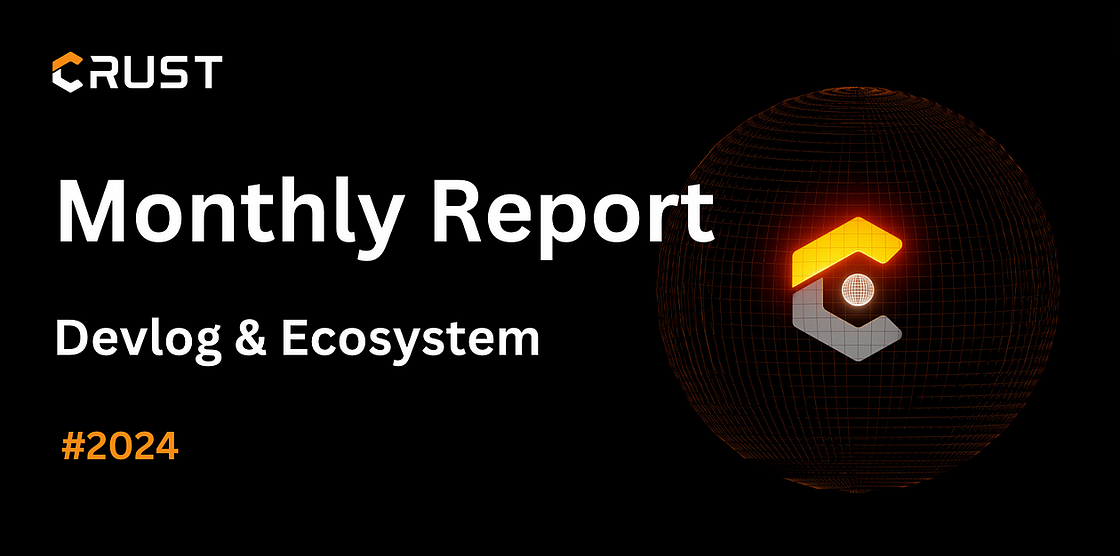
10 months ago
Crust Network Enhances Ecosystem with Wallet Update and Strategic Collaborations
Crust Network has recently made significant strides in enhancing its ecosystem, particularly with the update of the Crust Wallet plugin to support the latest version of the Chrome browser. This upgrade not only improves compatibility and resolves user-reported issues but also enhances the overall user experience by providing smoother interactions and increased security. Users can now manage their accounts, sign transactions, and perform storage operations more efficiently. Additionally, the Crust community is encouraged to explore other wallet tools like Subwallet and Talisman, which offer unique features and support for the Crust Mainnet and Parachain.
In terms of technical advancements, the EIP-5625 proposal has reached its final stage, indicating that Crust will soon implement features aimed at optimizing on-chain storage interactions while enhancing security measures. The Crust development team is actively monitoring this proposal's implementation to ensure seamless access for users to Ethereum's enhanced storage ecosystem. Furthermore, the Crust Bags project has received approval under the Ton Grant, with initial feedback summarizing optimization aspects and plans for market-side collaboration and promotion in the pipeline.
Crust Network is also expanding its ecosystem through collaborations with various projects, including the acceptance of the ERC-5625 proposal by Ethereum, which enhances NFT metadata storage capabilities. The network is committed to driving innovation and growth, as evidenced by its participation in community events and partnerships. Notably, Crust hosted discussions on decentralized storage solutions and participated in the first official Polkadot meetup in Tokyo. As the network looks towards 2025, it aims to continue fostering collaboration and advancing decentralized storage solutions, ensuring a brighter future for its ecosystem.

10 months ago
Roam Launches Innovative Loan Program to Expand Decentralized Wireless Network
Roam, a pioneer in decentralized wireless networks, has announced a partnership with Huma Finance to introduce the Roam Loan Program. This innovative initiative aims to reduce entry barriers for users and facilitate the growth of Roam's decentralized wireless network. The program allows users to acquire high-performance Roam routers with a 30% down payment in stablecoins, while Huma Finance finances the remaining 70%. As part of Roam Growth, the Loan Program enables users to earn rewards through network participation, with loan repayments made via airdrops and mining rewards, ensuring that users benefit from their router earnings once the loan is settled.
The Roam Loan Program is designed to empower users by transforming them into active contributors within the Roam ecosystem. Utilizing Web3 technologies such as decentralized identifiers and verifiable credentials, Roam prioritizes user privacy while incentivizing engagement. Participants in the program can enjoy daily rewards, access to an exclusive burning pool that enhances the value of the $ROAM token, and airdrop opportunities from early purchases. The Rainier MAX60 router, which is part of this initiative, features advanced Wi-Fi 6 technology and offers exceptional performance, further encouraging users to join the decentralized network.
With the successful launch of the Roam Loan Program, Roam is making significant strides towards building a decentralized open wireless network. The overwhelming demand for the first batch of routers reflects a growing interest in decentralized connectivity solutions. Currently, Roam boasts nearly 2 million registered users and over 1.1 million self-built Wi-Fi nodes, showcasing its rapid expansion. As Roam continues to grow and forge strategic partnerships, it is well-positioned to play a crucial role in the future of Web3 telecom, allowing users to earn passive income while contributing to the evolution of global connectivity.
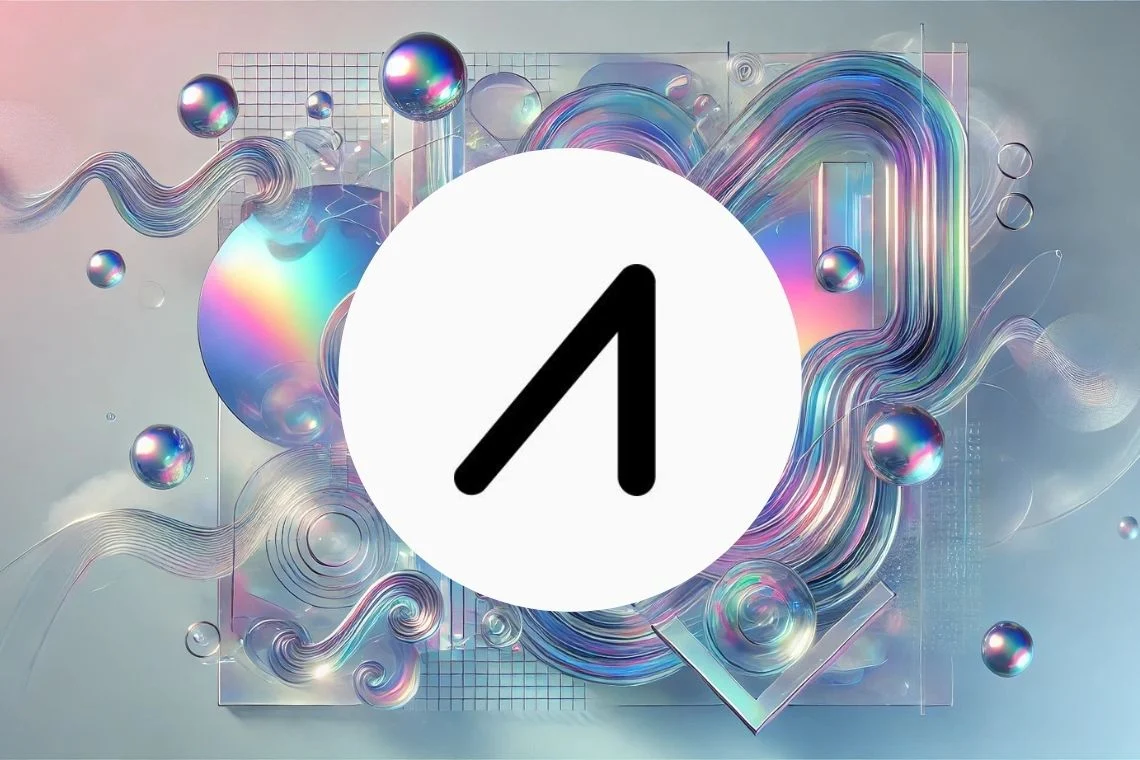
10 months ago
AIOZ Network: Pioneering Decentralized Infrastructure in 2024
The AIOZ Network is a notable player in the burgeoning sector of Decentralised Physical Infrastructure Network (DePin). Founded in 2017 by Erman Tjiputra, this blockchain platform is designed to revolutionize digital content storage, transmission, and monetization. Utilizing a Delegated Proof-of-Stake (DPoS) consensus mechanism, AIOZ can process up to 1,400 transactions per second, showcasing its scalability. The network operates on a decentralized content delivery system powered by over 217,000 P2P nodes, which are rewarded with the native AIOZ token for their contributions. AIOZ also provides a decentralized marketplace for AI assets, allowing users to monetize their resources while addressing concerns related to data centralization and user privacy.
In 2024, the AIOZ token experienced remarkable growth, skyrocketing approximately 700% from $0.14 to $1.12. This surge was fueled by a bull wave that began in February, attracting significant investor interest. Despite a brief pause during the summer, the token's value resumed its upward trajectory in November, maintaining strong support above the EMA 50. Currently priced at $1.02 with a market capitalization of $1.14 billion, AIOZ ranks #86 on CoinMarketCap. Looking ahead to 2025, the token is expected to continue benefiting from the DePin trend, although potential bearish movements could see it drop to around $0.80.
While AIOZ Network operates within the Ethereum and Cosmos ecosystems, the majority of DePin activity is concentrated on Solana. A recent report highlighted that four of the five largest decentralized physical infrastructure networks are based on Solana, with Grass leading the pack by contributing 2.5 million devices. The DePin sector has seen a substantial increase in demand for data processing, with top projects earning $500 million in revenue, marking a 33-fold growth from the previous year. AIOZ, positioned 14th in terms of node count, continues to be a significant player in this rapidly evolving landscape.
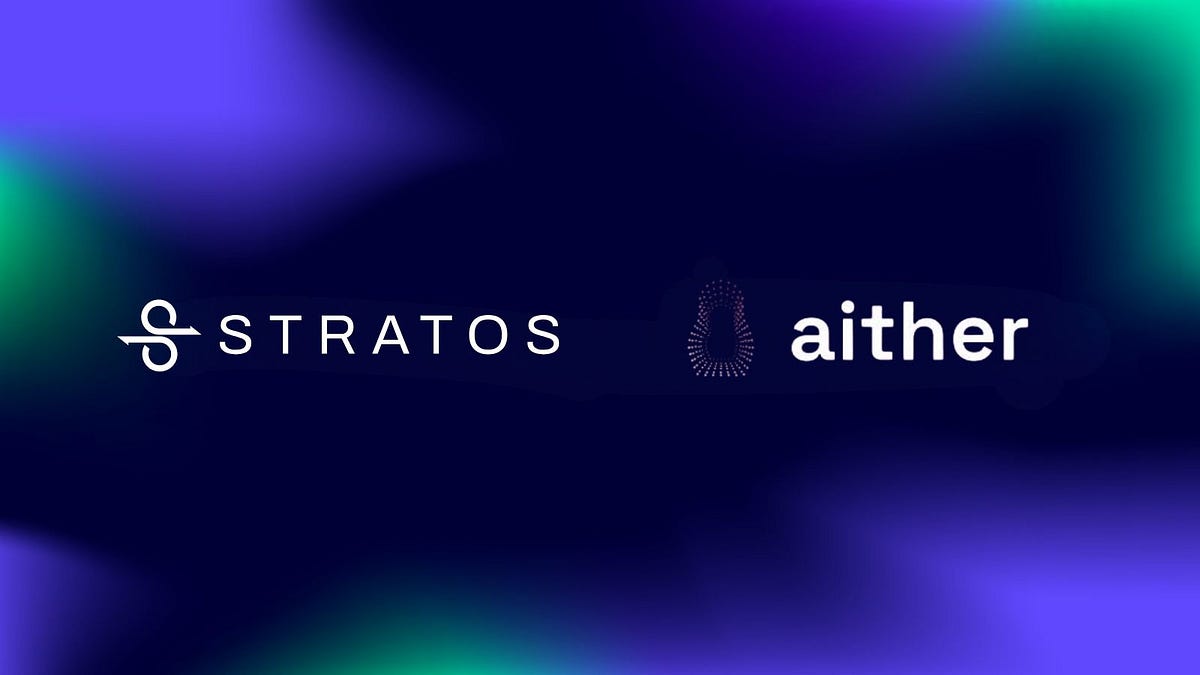
10 months ago
Stratos and AITHER Partner to Revolutionize AI Infrastructure
In an exciting development for the intersection of artificial intelligence and decentralized technology, Stratos has announced a partnership with AITHER, the creators of a next-generation AI infrastructure. This collaboration aims to accelerate advancements in AI and decentralized systems by integrating their innovative technologies. AITHER's Agent Virtual Machine (AVM) is designed to redefine AI infrastructure, providing a layer-zero framework that enables scalable and collaborative AI agents. This system simplifies AI development through high-level abstractions, making complex agent code more manageable while ensuring that all operations are traceable and observable.
Stratos complements AITHER's vision by empowering Web 3.0 builders and decentralized applications (dApps) with its comprehensive decentralized infrastructure network. With over 900 storage nodes and a capacity nearing 21 PB, Stratos offers scalable and reliable decentralized storage, computing, and database solutions. Its unique Proof-of-Traffic consensus model incentivizes network nodes, enhancing performance while maintaining privacy and trustless operations. By leveraging Stratos's infrastructure, AI developers can efficiently store and process massive datasets, which are crucial for training advanced AI models.
The partnership between AITHER and Stratos promises to unlock new possibilities for AI agent development and deployment. By integrating Stratos's Decentralized Storage Network into AITHER's AVM ecosystem, they aim to enhance security and scalability for AI operations globally. This collaboration will provide robust and trustless data storage solutions, ensuring data integrity and accessibility for AI agents. Together, AITHER and Stratos are committed to driving the next generation of AI and decentralized technology, building a future where AI agents operate with enhanced security, transparency, and efficiency, all powered by decentralized systems that prioritize privacy and trust.
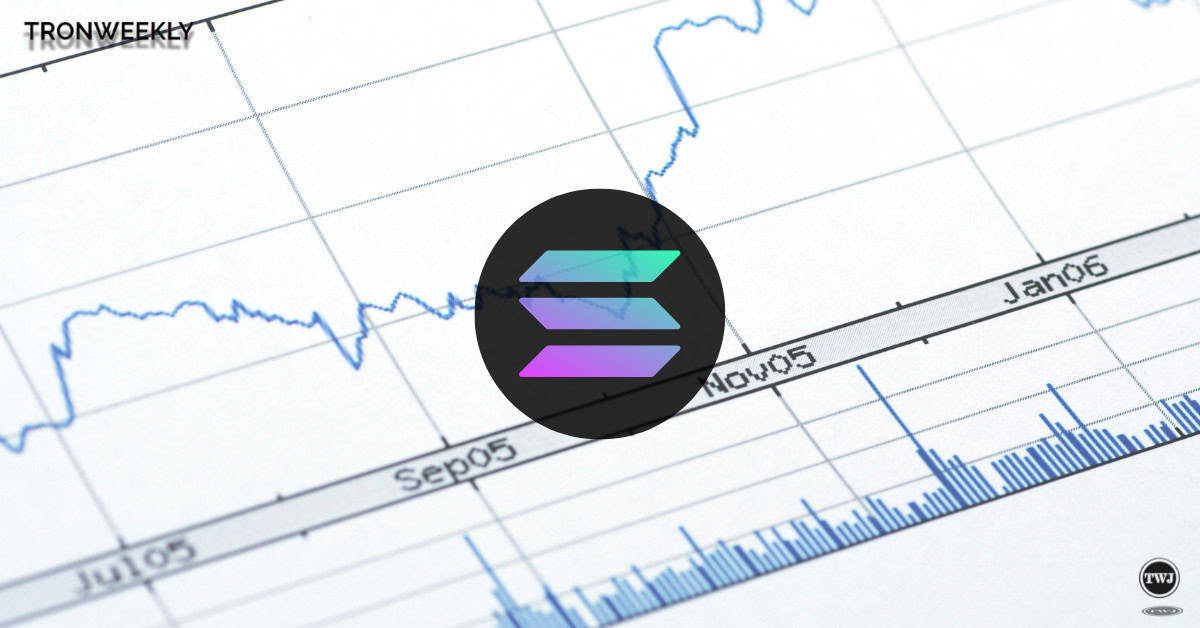
10 months ago
Solana's Seeker Phone and Innovations Set to Transform Blockchain Landscape
Solana is gearing up for a transformative year with the anticipated launch of its Seeker phone, priced at $500. This mobile device, the second offering from Solana Mobile, has already garnered an impressive 145,000 pre-orders. Set to launch in mid-2025, the Seeker phone not only enhances the hardware landscape but also integrates lucrative token airdrops, which are expected to attract more users to Solana's decentralized app (dApp) ecosystem. This initiative reflects Solana's commitment to expanding its reach and utility in the blockchain space.
In addition to the Seeker phone, Solana is also introducing the Firedancer client, developed by Jump Crypto. This validator software aims to enhance the scalability and performance of the Solana network. Although currently operating in non-voting mode, its full activation is highly anticipated among investors. Furthermore, the decentralized physical infrastructure networks (DePINs) are gaining traction, with DAWN, a decentralized internet service provider, planning to launch its mainnet in 2025. This could potentially reignite interest in DePINs, which have seen fluctuating enthusiasm in the past.
The innovation does not stop there, as Solana is also venturing into the fitness technology sector. The Pulse fitness bracelet, linked to the Solana network, is set for release in Q1, while the second generation of Cudis’ Solana smart ring has begun shipping. These developments underscore Solana's strategy to merge blockchain technology with real-world applications. Additionally, Jito's upcoming restaking platform is expected to redefine staking within the Solana network, further attracting validators and liquidity providers. With such diverse offerings on the horizon, 2025 is poised to be a pivotal year for Solana's growth and influence in the blockchain industry.

10 months ago
DIMO and CoinFund to Host DePIN Event in New York
DIMO is set to host an event in collaboration with CoinFund on January 15th in New York, focusing on DePIN insights and builder demonstrations. This gathering aims to bring together enthusiasts and developers in the decentralized physical infrastructure network (DePIN) space. The event will run from 6 PM to 8 PM EST and promises to be an engaging evening filled with valuable insights and networking opportunities. Attendees are encouraged to RSVP to secure their spot for this exciting occasion, as highlighted in DIMO's official announcement on social media.
DIMO operates as an open vehicle connectivity platform that allows car owners to connect their vehicles, manage their data, and potentially monetize this information. The platform is built on the Ethereum Virtual Machine, utilizing blockchain technology to create secure identities for users and vehicles through NFTs and smart contracts. DIMO emphasizes transparency and trust by leveraging open-source components, which enhances confidence among users and developers in the connected services and devices ecosystem.
The DIMO token plays a crucial role within the ecosystem, serving as the primary medium of exchange and incentive. Vehicle owners can earn tokens by sharing their data or utilizing specific services, which encourages active participation. This tokenized model not only fosters innovation among developers but also promotes the creation of cost-effective solutions and new application categories in the vehicle data sector. As DIMO continues to grow, it aims to revolutionize the way vehicle data is managed and monetized, benefiting both users and developers alike.
Signup for latest DePIN news and updates